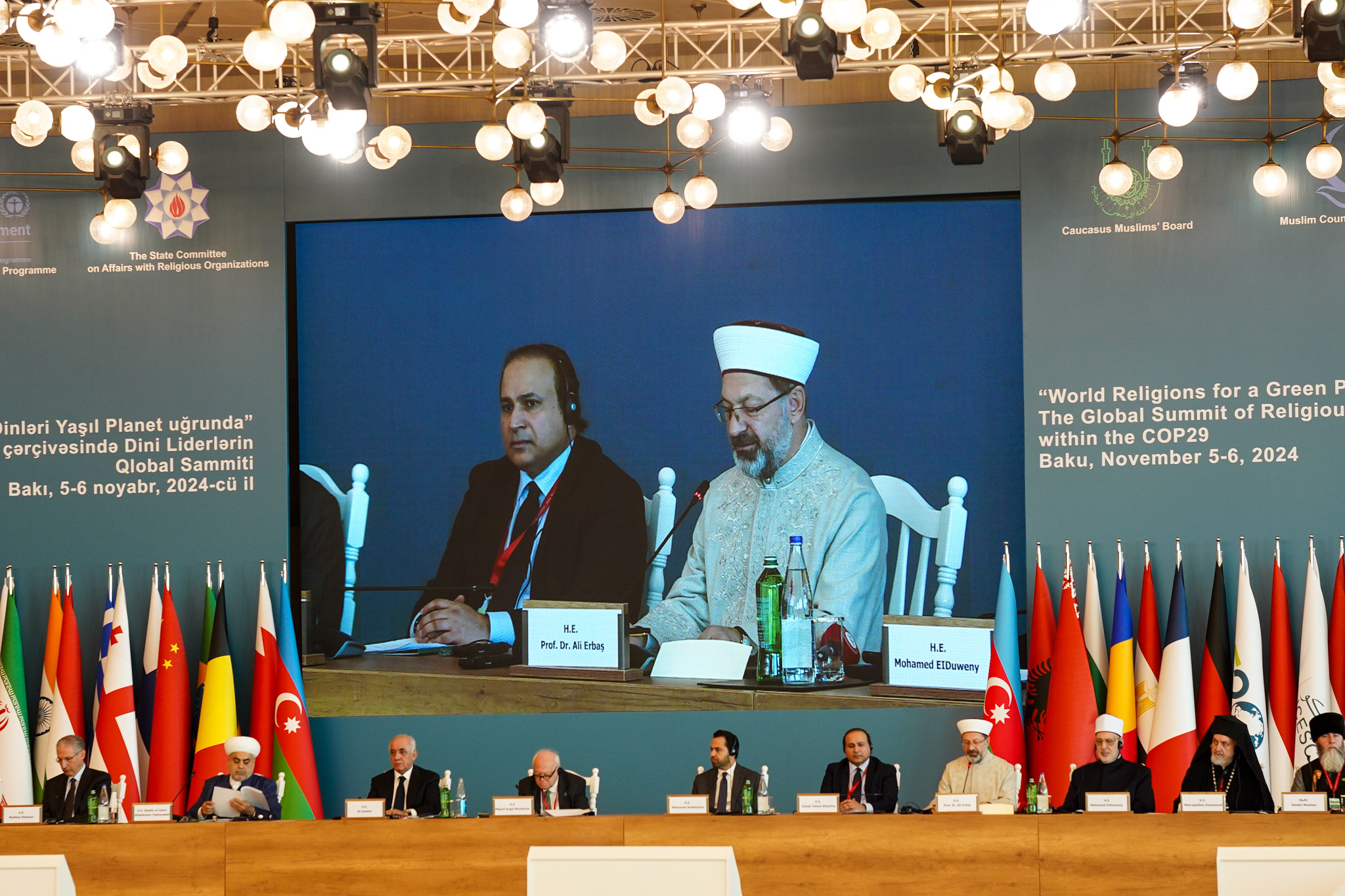
In the face of a rapidly changing climate, the world's religious leaders have a unique and powerful voice. At the recent Global Summit of Religious Leaders, themed “World Religions for a Green Planet” and held in anticipation of COP29, Azerbaijan’s Ministry of Ecology and Natural Resources, in collaboration with key partners such as the UN Environment Program (UNEP) and the Caucasus Muslims Board, hosted the event, culminating in the adoption of the Baku Declaration, designating 2024 as the "Year of Solidarity for a Green World." The Declaration and accompanying Appeal emphasized the critical role of interfaith and intercultural dialogue in addressing climate change. KAICIID’s Secretary General highlighted the transformative potential of dialogue, stressing its ability to unite secular and religious stakeholders in the search for innovative solutions to today’s urgent environmental issues. The event brought together 300 distinguished participants, including global religious leaders, foreign government representatives, senior UN officials, heads of international organizations, and leading religious scholars.
As outlined in the Baku Declaration, KAICIID welcomes the emphasis on strengthening inter-civilizational and interreligious relations, an endeavour that is core to its mission. The declaration serves as a testament to the need for partnerships that transcend cultural and religious boundaries. Through such partnerships, KAICIID has successfully fostered impactful interfaith dialogue on environmental preservation, uniting secular and faith-based perspectives to advance collective goals.
One of KAICIID’s key contributions to this dialogue is its Global Dialogue Forum, a platform that brings together religious and secular voices to engage in meaningful discussions on critical global issues, including preservation of environment. The forum has proven invaluable for nurturing understanding, facilitating partnerships, and inspiring concrete actions that support environmental stewardship and sustainable practices. In this spirit, KAICIID has committed to expanding its work on "Sacred Ecology," a concept that aligns deeply with the spiritual obligations many faith communities feel towards protecting the natural world.
KAICIID’s contribution to sacred ecology is about recognizing the profound spiritual value of environmental preservation. Through this approach, faith communities across regions are mobilized to see their environmental initiatives not only as societal responsibilities but also as spiritual imperatives. For example, in collaboration with UNEP-Faith for Earth, KAICIID supports capacity-building programs on faith, environment and climate change to equip religious actors with the resources to drive the implementation of the UN Sustainable Development Goals and lead sacred ecology projects. These initiatives are grounded in a shared belief in the sanctity of life and the responsibility to protect all forms of it.
KAICIID is also working with the World Resources Institute (WRI) on initiatives to prevent food loss and food waste, addressing an essential component of food security. In Rwanda, KAICIID and WRI are working to engage religious leaders in food security efforts, with plans to expand this model across the region. These efforts align closely with KAICIID’s 2024-2027 Strategic Plan, which prioritizes environmental sustainability alongside the protection of sacred sites.
KAICIID is a member of the International Partnership on Religion and Sustainable Development Workstream WECARE on Water, Environment and Climate Action The premise of the workstream is that faith actors and faith-based approaches have an important contribution to make global efforts to reduce, prevent and reverse environmental degradation and to help mitigate the damaging and life-threatening effects of climate change and the environmental crisis, as described in SDGs 6, 13, 14 and 15.
In line with the Baku Appeal, KAICIID also welcomes the proposal for a Permanent Advisory Council of Religious Leaders under the Conference of the Parties to the UN Framework Convention on Climate Change, recognizing the vital need for continuous, structured dialogue between religious and secular actors to effectively tackle climate change. This aligns with KAICIID’s foundational mandate to address contemporary societal challenges, including environmental preservation and ethical and religious education. Through its longstanding experience in creating spaces where religious and secular voices can come together, KAICIID continues to honour its mission and is well positioned to support spaces that aim at fostering understanding and action on critical global issues
In addition, KAICIID is focused on combating xenophobia and discrimination. Through its partnership with the Saudi Media Forum, KAICIID is actively leveraging media’s role in promoting tolerance and understanding across cultural and religious divides.
At the grassroots level, KAICIID Fellows Programme plays an instrumental role in this mission. These Fellows, leaders in their communities, can amplify KAICIID’s environmental protection efforts by promoting sustainable practices and sacred ecology principles. With a focus on empowering women, youth, and indigenous peoples, KAICIID’s work in this area will pay particular attention to ensure that all voices, especially those most affected by climate change, are part of the conversation.
As the climate crisis continues to demand immediate and innovative action, KAICIID stands committed to fostering interfaith and intercultural dialogue, building capacity, and collaborating with partners to protect our shared planet. Through platforms like the KAICIID Global Dialogue Forum and initiatives grounded in sacred ecology, KAICIID is not only amplifying the call to climate action but is also empowering faith communities worldwide to be champions of environmental preservation and social responsibility. KAICIID affirms its commitment to such dialogue platforms and aspires to engage in future editions, particularly next year that the Presidency will be held by Brazil; a region where KAICIID launched its programmatic expansions and it’s in the process of developing a regional strategy.